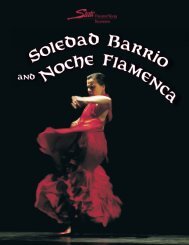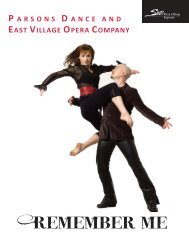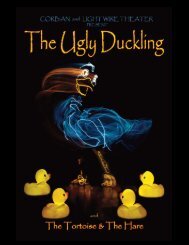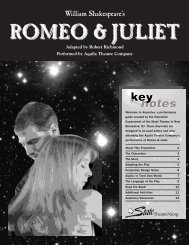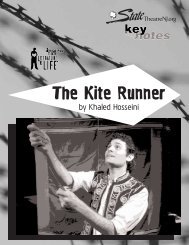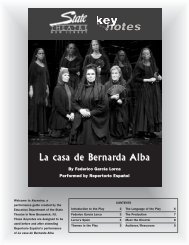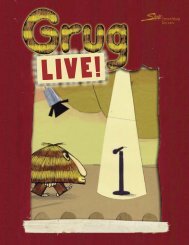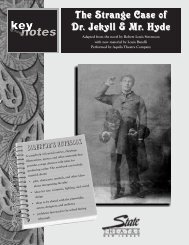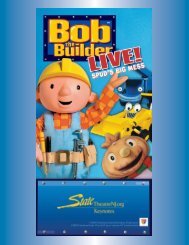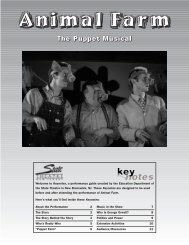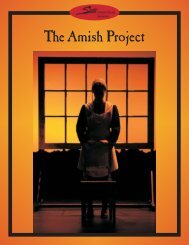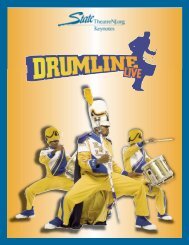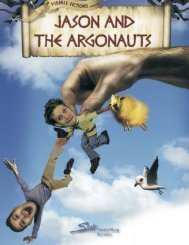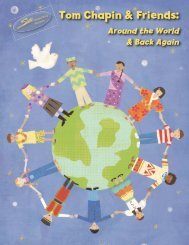Hamburg Symphony Orchestra - State Theatre
Hamburg Symphony Orchestra - State Theatre
Hamburg Symphony Orchestra - State Theatre
You also want an ePaper? Increase the reach of your titles
YUMPU automatically turns print PDFs into web optimized ePapers that Google loves.
Vaughan Williams:<br />
7<br />
The Wasps Overture<br />
Wasps are not loveable insects. In the summer and fall, they<br />
swarm around visitors at street cafes, landing on whatever is<br />
sweet on the table and often enough in drinks. It is impossible to<br />
get rid of them without attracting even more of the creatures.<br />
This appears to have been the case in antique times as well, for<br />
the Greek dramatist Aristophanes, in his comedy The Wasps from<br />
422 BC, used wasps as a metaphor for litigious citizens who took<br />
every opportunity to engage in legal battles. The historical<br />
background for this was an increase in the remuneration for<br />
citizens who served as trial judges. In ancient Athens, with its<br />
specific early form of democracy, being a judge was not an<br />
institutionalized profession, but rather one of the responsibilities<br />
required of full citizens. Following the laws of the city, judges<br />
arrived at their decisions after both parties in a case – the accuser<br />
and defendant or their representatives – had presented their<br />
positions. For this, the judge received a kind of expense<br />
allowance, which was increased by a third under the rule of Cleon.<br />
As a result, the willingness of the Athenians to go to court grew<br />
dramatically, which Aristophanes used as the point of departure<br />
for his comedy. He dealt with this situation in a highly satirical<br />
manner by making the chorus of amateur judges into wasps and<br />
the stylus with which the decision was written a wasp’s stinger.<br />
Ralph Vaughan Williams composed his incidental music in<br />
1909 for a performance of The Wasps at Trinity College in<br />
Cambridge. He wrote not only the usual overture and interludes<br />
between scenes, but also set a number of complete scenes to<br />
music, so that the entire incidental music for the play lasts almost<br />
two hours. The music is rarely performed in its entirety, but<br />
Vaughan Williams himself arranged a suite consisting of five<br />
instrumental pieces. The suite begins with an overture that is in<br />
itself a splendid concert piece. The wasps can be heard<br />
immediately; the instruments as they enter conjure up a swarm of<br />
insects that buzz aggressively around the ears of the listeners.<br />
This introduction is followed by the spirited presentation of three<br />
themes sung by the chorus in the course of the play. This lively<br />
music exudes energy and high spirits. It was particularly<br />
important to Jeffrey Tate to bring music by an English composer<br />
to audiences on the <strong>Hamburg</strong> <strong>Symphony</strong> <strong>Orchestra</strong>’s American<br />
tour. Vaughan Williams’s setting of music for the ancient comedy<br />
is modern and delightful, full of striking instrumental effects<br />
without literally invoking antique musical conventions.<br />
© 1994 Columbia Artists Management Inc.<br />
Ralph<br />
Vaughan<br />
Williams<br />
was born in<br />
1872 in the<br />
Cotswold<br />
village of<br />
Down<br />
Ampney. He attended the Charterhouse School<br />
followed by Trinity College in Cambridge. Later he<br />
was trained by Hubert Parry and Charles Stanford at<br />
the Royal College of Music.<br />
Until he was 32-years-old Vaughan Williams<br />
showed no desire to be anything other than an<br />
industrious and efficient church musician. Fortunately<br />
after a few years at his first professional post as<br />
organist at the St. Barnabas Church in London he was<br />
introduced to English folk music and his former<br />
interest in church music was overtaken by his passion<br />
for folk songs. This gave Vaughan Williams the<br />
materials he needed to build new musical works.<br />
Between 1905 and 1907 he wrote three Norfolk<br />
rhapsodies for orchestra and produced a major<br />
choral work, “Toward the Unknown Region” in the<br />
English style, however inspired by American poet<br />
Walt Whitman. He completed his first important<br />
piece of work just two years later—Fantasia on a<br />
Theme by Thomas Tallis.<br />
After the war he joined the faculty of the Royal<br />
College of Music teaching composition. He also<br />
became the conductor of the Bach Choir in London<br />
from 1920-1926. Premieres of his works became<br />
events of national significance. In the decade<br />
following World War I he composed numerous<br />
masterpieces still heard today. In 1935 he received<br />
one of the highest awards a composer can receive –<br />
the Order of Merit. He died on August 26, 1958.



